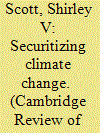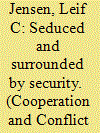| Srl | Item |
| 1 |
ID:
085423


|
|
|
|
|
| Publication |
2008.
|
| Summary/Abstract |
On 17 April 2007 the United Nations Security Council held its first debate on climate change, energy and security. Since then, and despite a number of reports emphasizing the security implications of climate change, there has, at least in diplomatic circles, been a move away from the previous trend towards accepting climate change as a question of international security. This is primarily due to the possibility of the Security Council taking the lead in coordinating global efforts to mitigate, or adapt to, climate change. Developing countries interpret this possibility as a rejection of the principle of common but differentiated responsibilities as incorporated into the United Nations Framework Convention on Climate Change. The increasing urgency of taking decisive action means that it is too early to rule out a role for the Council with its coercive powers. Ultimately, however, the success of any international regulations will depend on their political legitimacy.
|
|
|
|
|
|
|
|
|
|
|
|
|
|
|
|
| 2 |
ID:
119231


|
|
|
|
|
| Publication |
2013.
|
| Summary/Abstract |
Combining elements of the Copenhagen school's securitization theory with a Foucauldian discourse analysis, this article examines certain discursive processes that emerged in the wake of Norway's 2005 High North Initiative. The Norwegian government's explicit politicization of energy issues appears to have acted as door opener, letting 'security' in to colonize the High North discourses once more. Russia is again firmly positioned as the 'radical other', leaving the discursive field open to various forms of securitizing discourses. The post-2005 discursive field of the Northern areas is, in many ways, more open-ended, complex and confusing than ever. The opening up and expansion of the concept of High North security means that 'everything' is seen as having a security potential. What does seem clear is the increasing presence of security in primary texts and the media debate: entry to and credibility in the discourse depends on 'security speak' across an ever-widening array of thematic contexts. The article also argues that a combination of securitization theory and discourse analysis seems a fruitful way forward in shifting more focus towards the active and important role of the audience in securitizing processes.
|
|
|
|
|
|
|
|
|
|
|
|
|
|
|
|